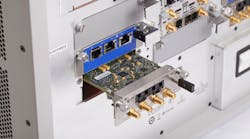As the United States has broadened its assault on China’s rising technology industry, including banning American firms from supplying chips to Huawai and other manufacturers, China has played up its ambitions to acheive self-sufficiency in chips. But challenging American dominance in the segment remains a David-versus-Goliath-type battle, industry analysts say.
U.S.-based companies accounted for around 50% of global semiconductor sales in 2018, more than 10 times China’s market share last year of around 3%, according to the latest estimates from IC Insights. American companies reaped roughly 68% of the fabless IC segment—compared to China’s market share of 13%—and 46% of sales to integrated device manufacturers (IDM). China’s IDM market share was less than 1% in 2018.
Despite the push for Chinese manufacturers to source 40% of all supply domestically by 2020 and 70% by 2025, chip production in China—including by foreign companies—accounted for just 15.5% of the country's $155 billion market last year. Chip production in China will grow to 20.5% of the $540 billion global market by 2023, while the market share of Chinese suppliers will double to just 8%, according to IC Insights.
The market researcher said “it will take decades for Chinese companies to become competitive in the non-memory IC product segments” including cellular modems, analog semiconductors, server processors and other key technologies. “While everyone is focused on China’s moves in the memory market, becoming self-reliant in non-memory IC segments poses an even more difficult problem for China,” IC Insights said.
China has stepped up its efforts over the last year to increase domestic chip production amid fears of being slapped with additional sanctions by the United States. Some industry analysts say the trade conflict could force China to speed up the development of an indigenous semiconductor industry. Sales by China-based companies surged 23% last year, faster than the overall global chip market, according to IC Insights.
Trade tensions between the United States and China could also cripple American companies. Broadcom, based in Silicon Valley, has slashed its sales forecast from $24.5 billion to $22.5 billion for 2019, blaming severe restrictions on supplying chips to Huawai, one of its biggest customers, and uncertainty caused by the broader trade battle. Qualcomm, Micron, and other suppliers have also curbed shipments to Huawei.

